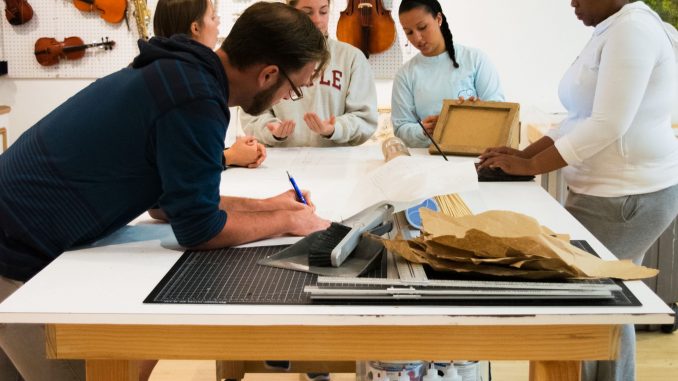
As an occupational therapy student, Nicole Perez never imagined she would use an electric saw in her work.
But on Friday, Perez, along with 43 other occupational therapy students, met in the Tyler School of Art to learn how to operate a jigsaw and bandsaw.
“We didn’t really know what we were getting into,” said Perez, a second-year occupational therapy graduate student. “But our professors have gone through trainings, like very vigorous trainings, so they really are able to support us completely.”
The students are learning crafting skills for their course, Occupational Therapy Practice: Assistive Technology. The course is an informal extension of Adaptive Design Greater Philadelphia, a project funded by Temple’s Institute on Disabilities to train Philadelphia health care professionals in creating devices out of cardboard to help people with disabilities.
This assistive technology consists of physical equipment, like a prosthetic or cardboard brace, and software programs that help people with disabilities maintain or improve their functionality.
Last Thursday, groups of occupational therapy students each met with a student at the West Philadelphia-based HMS School, which serves students from ages 5 to 21 who have neurological disabilities, like cerebral palsy. After assessing the needs of their assigned student, the occupational therapy students will gather in Tyler on Thursdays and Fridays for the next three weeks to construct an assistive device out of cardboard to accommodate the student’s disability.
Perez’s group is helping a 12-year-old student, Eddie, improve his ability to communicate. He currently operates a communication board by pressing a switch with his head, an activity that becomes tiring for him when repeated throughout the day, Perez said. To help ease his fatigue, the group will construct a cardboard wheelchair tray outfitted with a flush red button that Eddie can press with his arm as another option besides the switch.
Perez said the group has built a personal “connection” with Eddie.
“It’s not just gonna be shipped out to someone,” Perez said. “It’s gonna be given to this exact child that we know.”
During one of the first construction sessions, one of Perez’s partners, second-year occupational therapy graduate student Dave Szczepanik, eyed a design sketch of the wheelchair tray as he traced pencil lines onto a sheet of cardboard. The sketch was drawn the previous day by junior architecture major Abby Freed, one of several architecture students who volunteered to help develop a feasible design sketch.
“As architecture students, we’re always building conceptual ideas, nothing that ever really gets implemented because we’re always doing things on such a large scale like designing buildings,” Freed said. “It was so cool to do something that was like immediate and helped someone so specific.”
Rochelle Mendonca, a rehabilitation sciences professor who teaches the course, monitored the groups as they began construction. But in addition to her role as a teacher, she was a student herself just a few months ago. From April to July, Mendonca participated in the first group of the ADGP program.
Conceived last April through a $75,000 grant from the Christopher and Dana Reeve Foundation, Adaptive Design Greater Philadelphia sent its participants, including Mendonca, to New York City to attend a training session.
Because every person’s needs are unique, Mendonca said many commercial products don’t work for all people, and the products that may work are often far too expensive. Compared to other materials like plastic, Perez added that cardboard can be easily remodeled to fit the changing needs of a user.
“So many of these adaptations that you buy are hundreds and hundreds and thousands of dollars and insurance doesn’t cover [them],” Perez said. “To be able to build something like this out of a cheap material that’s durable and will last and will provide exactly what they need is amazing.”
In early November, the group will meet with Eddie again to finalize the design. Following the completion of the device’s construction, Tyler students will then join the collaboration by painting the wheelchair tray with dinosaurs and Pokémon characters, two of Eddie’s main interests.
Although Perez has only studied assistive technologies for about a month, she said she is already excited by the prospect of creating her own tools as an occupational therapist.
“If you told me that I was gonna do this before I went into [occupational therapy] school, I’d say, ‘No, I’m not gonna be an architect. … I don’t work with power tools,’” Perez said. “Because of this course and because of this whole program coming to Philadelphia, [it] has really opened a lot of doors.”
Dan Shade contributed reporting.


Be the first to comment